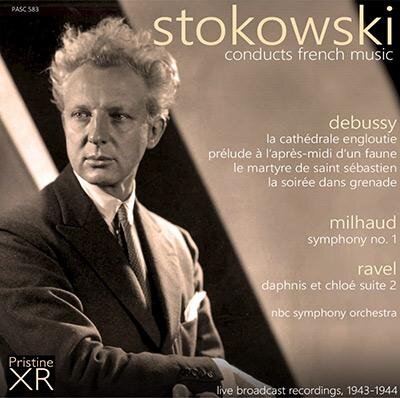The destiny and legacy of the NBC Symphony and Arturo Toscanini are so inextricably bound that it is sometimes easy to forget that each had a life of its own, occasionally even far apart. Throughout the orchestra’s existence they collaborated with a long rotating list of guest conductors. But for a brief period spanning the 1941 – 1942 season, the Maestro split altogether, fallout from a fracas with NBC’s management. Though he eventually would return, Leopold Stokowski was appointed his replacement during the interregnum, enlivening the repertoire with a number of world and local premieres of the sort of music Toscanini never touched.
Stokowski also was, as a recent compilation from Pristine Audio reminds the listener, himself a superb Beethoven interpreter, if of a totally different type from his elder colleague. Whereas Toscanini cultivated a lean and tight sound that highlighted the music’s freshness, Stokowski’s interpretations of Beethoven’s Fifth, Sixth, and Seventh are dark-hued, imposing, and Romantic; with flexible tempi, grand rhetorical gestures (listen to the opening “fate” motif of the Fifth), and a quasi-cinematic breadth of sonority. Stokowski had recorded Beethoven before and would do so again much later, but these NBC interpretations arguably capture him at his best.
The gem of this compilation may be his Reubenesque rendering of the Seventh, which has a voluptuousness of tone rarely heard in Beethoven (or from the NBC Symphony, for that matter). It is songful, yet heaven-storming; with an “Allegretto” whose funereal cast is like something out of the expressionistic world of Murnau and Lang. Nothing drags, however, and it is followed by propulsive and vigorous readings of the final two movements that leave one clutching their seat. How the audience at Studio 8-H managed to keep themselves from screaming their heads off at the vertiginous excitement that Stoki goaded from the NBC strings at the finale’s coda is beyond me.
Of his various recordings of the Beethoven Fifth, this NBC performance may be Stoki’s finest, aided by a touch of rhythmic tightness that sharpens the contours of its drama. When the finale’s blaze of light erupts upon the scherzo, Stoki conveys a sense of implacable triumph: Nothing can (and does) stop Beethoven’s victory.
Stoki’s super sleek approach to the Beethoven Sixth, fine performance though it is, has little of the earthy bumptiousness this music demands. (It is the “Pastoral,” after all.) His is very much an urbanite’s glossy daydream of country life rather than the thing itself; the central scherzo sounding more like the frolicking of impeccably airbrushed models for The Gap, than that of peasants.
Also in this collection are some of Stoki’s Wagner performances with NBC; appropriate given the conductor’s Wagnerian approach to Beethoven, including a steamy, XXX-rated rendition of the “Prelude to Act I” and “Liebestod” from Tristan und Isolde that practically scorches one’s speakers.
While this material has been made available before, the sound restoration by Andrew Rose polishes it further to a lustrous gleam. Nowhere can this be heard better than on Stoki’s NBC Beethoven Seventh, previously heard on a deleted Cala disc which suffered from an unusually over-filtered transfer. Bad memories of that CD are immediately cast aside by this present reissue, with the strings especially taking on a vivid presence nothing like the boxiness one normally expects from this venue.
Here’s to hoping Pristine keeps the treasures from NBC’s vault coming.
Lustrous and bold: Stokowski’s Beethoven with the NBC Symphony.



